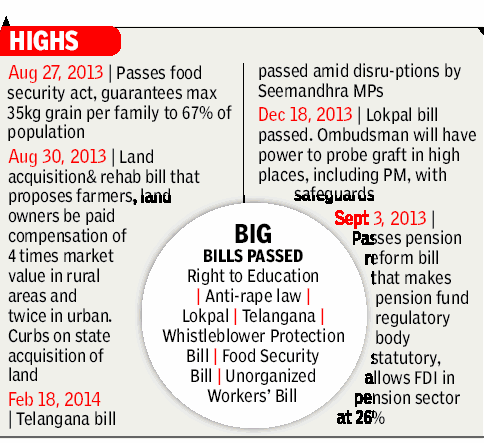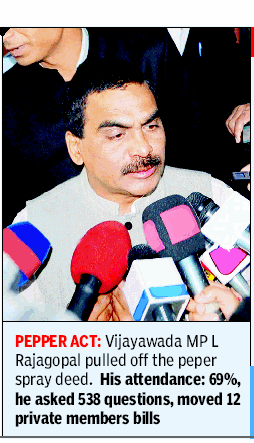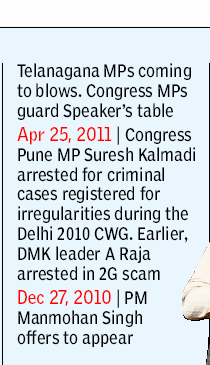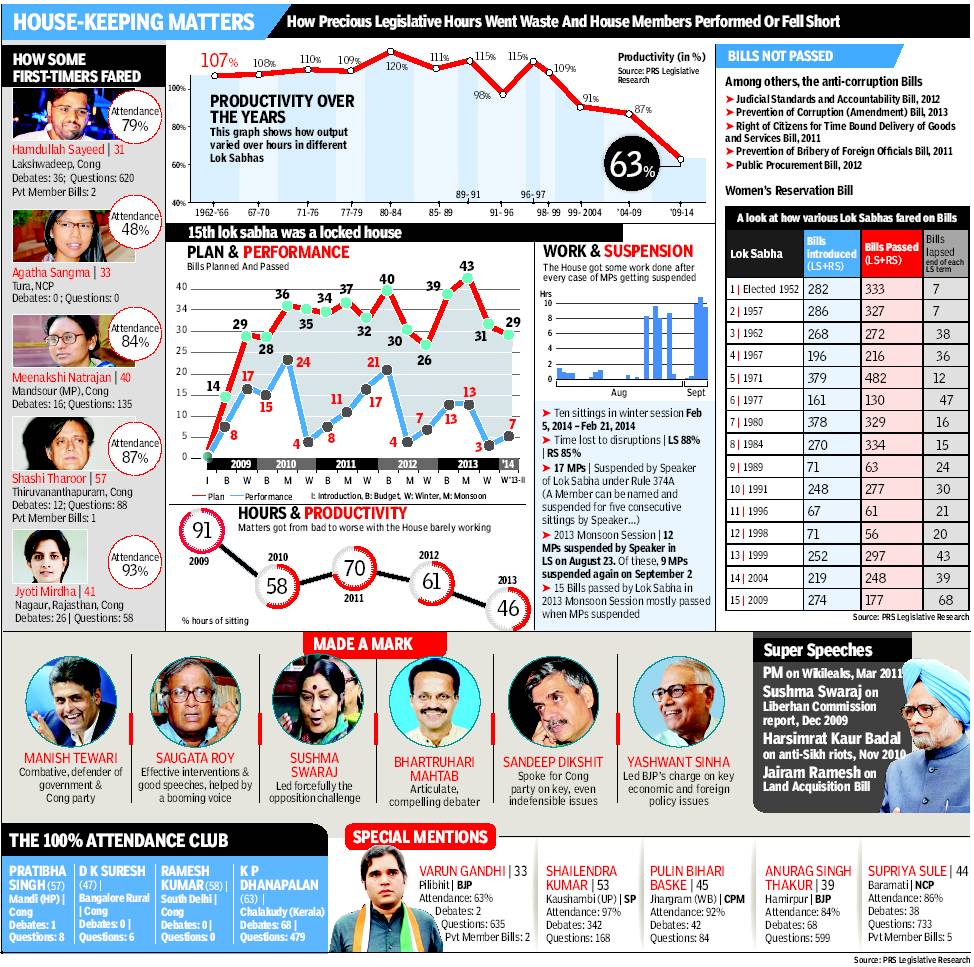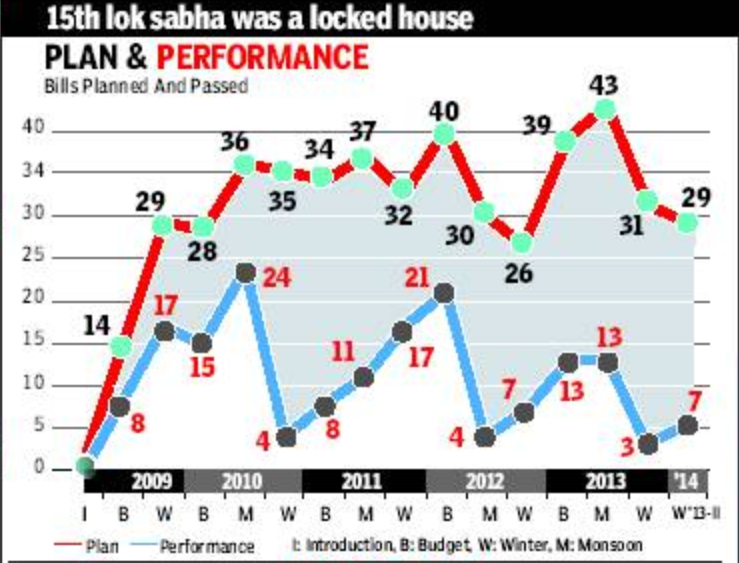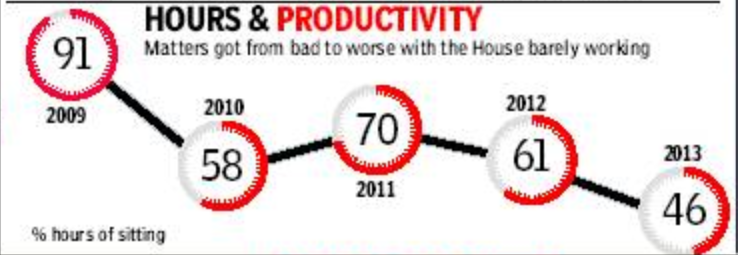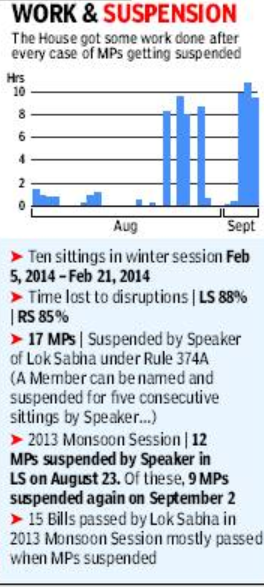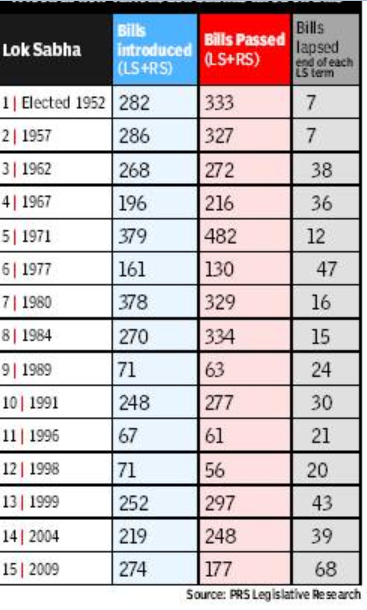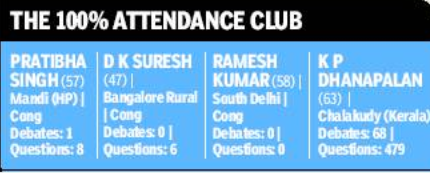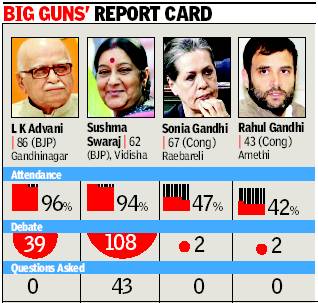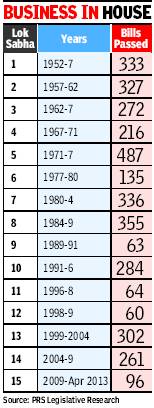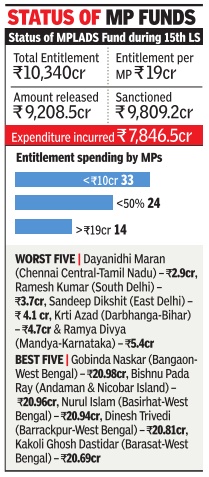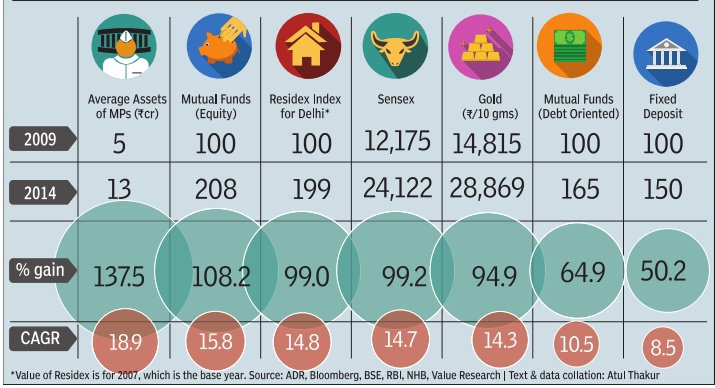The 15th Lok Sabha: 2009-14
(→Celebrity MPs) |
(→Local area funds: many MPs did not spend) |
||
| Line 102: | Line 102: | ||
I have started identifying areas and works to ensure that the amount is entirely spent,” said East Delhi MP Mahesh Girri, a first-time MP. Sources said first-time BJP MPs have been asked to utilize the funds and there will be strict monitoring during the current term of the House. | I have started identifying areas and works to ensure that the amount is entirely spent,” said East Delhi MP Mahesh Girri, a first-time MP. Sources said first-time BJP MPs have been asked to utilize the funds and there will be strict monitoring during the current term of the House. | ||
| + | =See also= | ||
| + | [[The 15th Lok Sabha: 2009-14]]/ [[The 16th Lok Sabha (2014- ): MPs ]] complete list of MPs / [[The 16th Lok Sabha (2014- ): trends ]] | ||
Revision as of 19:25, 17 August 2014
These are newspaper articles selected for the excellence of their content.
|
Contents |
The 15th Lok Sabha: 2009-14
LOST SABHA: ALL DIN, LITTLE DONE
15th LS Will Be Remembered As The Pepper Spray House, But It Passed Some Key Laws Too
The Times of India TIMES NEWS NETWORK
New Delhi: Parliament can’t be proud of the legacy of the 15th Lok Sabha, which, many believe was an unusually painful chapter in the country’s legislative history.
Corruption was the dominant narrative. Ministers were sent to jail. Others demeaned the institution in numerous ways — disrupting proceedings, giving the short shrift to important legislative business, culminating in the unedifying spectacle of an elected representative showering pepper spray on the House. Through these years, UPA 2’s policy paralysis and lack of governance was for all to see in the House. Faced with waves of corruption charges — from CWG to 2G and Coalgate, the treasury benches turned almost catatonic — there was almost complete absence of political and administrative direction.
During the 2G scam, the opposition disrupted Parliament as they demanded a JPC to probe the spectrum mess. For days, the government resisted — ultimately a JPC was established but precious legislative time was wasted. The story was repeated in different ways as the government refused to engage the opposition to carry out their legislative agenda.
In the rare instances when both sides of the aisle joined forces — for instance, during the Lokpal Bill, Telangana creation, amending criminal laws after the Nirbhaya incident, Food Security Bill — we saw glimpses of what could have been. Occasionally, the opposition came together bringing the government to its knees. When the Nuclear Liability Bill came up, opposition parties figured out how one small punctuation mark in the bill could have changed the meaning. Eventually, the government gave in.
Parliamentary debate almost disappeared. Time was when these debates were subjects of wise discourse. Despite media scrutiny the average time spent on major legislation was a meagre 17 minutes, which included Budget debates. On the brighter side, this House passed some significant legislation — amending a century-old land acquisition law, Food Security, Lokpal, changing the criminal code after the Nirbhaya episode and creating Telangana.
Younger MPs are yet to show mettle, with a special mention to be reserved for Rahul Gandhi, who consistently underperformed. Most were unremarkable, leaving the more substantive interventions to be made by the older generation. The usually silent PM exhibited moments of eloquence that stumped the opposition. Sushma Swaraj came into her own as leader of opposition. The 15th LS passed 177 Bills, but over 60 legislations remained undone. These lapse with the end of this session. It confirms that this was the worst performing LS.
15th Lok Sabha to be least productive ever
Has Passed Only 96 Of 365 Bills Tabled
By Rukmini Shrinivasan The Times of India 2013/05/02
The 15th Lok Sabha is well on track to achieving the dubious distinction of having passed the fewest bills. It is likely to end up being the one that sat for the least time — just 1,157 hours until Monday. The number of days the Lok Sabha sits has been steadily falling and now averages 75 per year, as against an average of 130 in the US House of Representatives. But beyond the hours of sitting is the key question of what is getting discussed in those hours.
Till 30 Apr 2013, the 15th Lok Sabha had passed 96 of the 365 bills the UPA government brought before it, according data from PRS Legislative Research, an independent, nonpartisan legislative research organization. To equal the previous low set by the 14th Lok Sabha, the House would have to pass 165 bills over the next one year, against the 96 it has passed in the past four. The 261 bills passed during the tenure of UPA-I was, until now, the poorest legislative performance during a full term of Parliament. The bills now pending before Parliament include those on food security, land acquisition, judicial accountability, the setting up of a Lokpal and various labour laws. The number of bills passed by Parliament has been in gradual decline over the past few decades, PRS’s analysis of 60 years of Parliament data shows. Even more worryingly, the time spent discussing each bill before passing it is also falling. In 2012, the two houses passed between them 11 bills on which they spent just 30 minutes each. In 2012, the Lok Sabha passed the anti-sexual harassment at workplace bill with no discussion.
As pressing issues raised by MPs spill out of zero hour into question hour and after, the proportion of time spent by Parliament on core legislative business is falling, says Chakshu Roy of PRS.
93 hrs lost in most disrupted budget session of 15th Lok Sabha
Bharti Jain The Times of India 2013/05/09
The Budget session — saddled by a washed out second half —ended [two days ahead of schedule], earning the dubious distinction of being the most disrupted budget session of the 15th Lok Sabha and second only to the 2010 winter session in terms of hours lost.
A good 92 hours and 40 minutes were lost to disruptions and forced adjournments, on account of sustained protests over Coalgate, Railgate and the leaked draft report of the JPC on 2G.
This was against a matching 94 hours and 42 minutes of sittings during the latest session, according to the data compiled by the Lok Sabha secretariat.
Had the session concluded as per schedule on May 10, the hours lost would have well surpassed the hours of sittings, given the bleak prospects of the House functioning on the two remaining days.
The picture was no different in the Rajya Sabha. According to PRS Legislative Research, the total productive time in the Upper House was 83 hours, which is just 52% of the scheduled time.
During the budget session of 2012, the Rajya Sabha worked for 94% of the scheduled time.
Sharp rise in the value of the assets of MPs
STATISTICS - ARE OUR NETAS FINANCIAL WHIZKIDS?
The Times of India Jul 20 2014
See the chart on this page
Local area funds: many MPs did not spend
15th LS MPs failed to use local area funds Dipak.Dash@timesgroup.com New Delhi
During the 15th Lok Sabha, MPs could not utilize about one-fourth of their funds under the MP Local Area Development Scheme (MPLADS), according to the government’s own admission.
Two dozen MPs, including three from Delhi, could not even spend 50% of the allocation, indicating how poorly the people’s representatives fared. Some with dismal records like BJP’s Kirti Azad, Shatrughan Sinha and tourism minister Shripad Naik got re-elected.
While West Bengal did a better job, with six of its MPs in the last Lok Sabha spending more than the entitlement of Rs 19 crore per constituency during this period, Delhi MPs had the worst record with Sandeep Diskshit and Ramesh Kumar managing to spend less than Rs 5 crore and former women and child development minister Krishna Tirath spending only Rs 8.16 crore.
MPs from Kerala, Tamil Nadu, Maharashtra, Uttar Pradesh, Madhya Pradesh and Andhra Pradesh had better records. Former minister Dayanidhi Maran ranked last, utilizing just 20% of the entitlement.
In a written reply in Lok Sabha last week, minister of state for statistics and programme implementation Rao Inderjit Singh said that under MPLADS, lawmakers recommend development works for creation of durable community assets on the basis of local needs.
The guidelines prescribe that all recommended works should be sanctioned by the district authorities within 75 days of receipt of the recommendation, and the MPs should be informed regarding rejections, if any, within 45 days with reasons. The deadline for completion of the works should generally not exceed one year.
“It seems many MPs are unaware of how the allocation can be utilized.
I have started identifying areas and works to ensure that the amount is entirely spent,” said East Delhi MP Mahesh Girri, a first-time MP. Sources said first-time BJP MPs have been asked to utilize the funds and there will be strict monitoring during the current term of the House.
See also
The 15th Lok Sabha: 2009-14/ The 16th Lok Sabha (2014- ): MPs complete list of MPs / The 16th Lok Sabha (2014- ): trends
